
The Acorn Electron was a lower-cost alternative to the BBC Micro educational/home computer, also developed by Acorn Computers Ltd, to provide many of the features of that more expensive machine at a price more competitive with that of the ZX Spectrum. It had 32 kilobytes of RAM, and its ROM included BBC BASIC II together with the operating system. Announced in 1982 for a possible release the same year, it was eventually introduced on 25 August 1983 priced at £199.

BBC BASIC is a version of the BASIC programming language released in 1981 as the native programming language for the BBC Micro personal computer, providing a standardized language for a UK computer literacy project of the BBC. It was written mainly by Sophie Wilson.
Acornsoft was the software arm of Acorn Computers, and a major publisher of software for the BBC Micro and Acorn Electron. As well as games, it also produced a large number of educational titles, extra computer languages and business and utility packages – these included word processor VIEW and the spreadsheet ViewSheet supplied on ROM and cartridge for the BBC Micro/Acorn Electron and included as standard in the BBC Master and Acorn Business Computer.
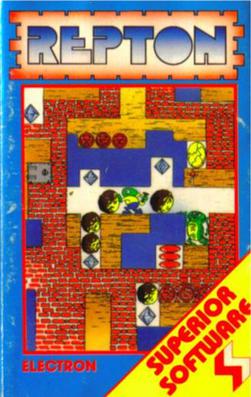
Repton is a video game originally developed by 16-year-old Briton Tim Tyler for the BBC Micro and Acorn Electron and released by Superior Software in 1985. The game spawned a series of follow up games which were released throughout the 1980s. The series sold around 125,000 copies between 1985 and 1990 with Repton 2 selling 35,000 itself. The games have since been remade for several modern systems, including iRepton for the iPhone / iPod Touch in 2010, and Android Repton 1, Android Repton 2 and Android Repton 3 from 2016 to 2018.

Superior Software Ltd is a video game publisher. It was one of the main publishers for the BBC Micro and Acorn Electron computers in the 1980s and early 1990s, and occasionally published software to the Commodore 64, Amiga, ZX Spectrum and Amstrad CPC. It currently releases games for Microsoft Windows, iOS and Android; mostly updates of its original games.
The Disc Filing System (DFS) is a computer file system developed by Acorn Computers, initially as an add-on to the Eurocard-based Acorn System 2.
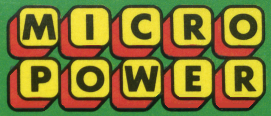
Micro Power was a British company established in the early 1980s by former accountant Bob Simpson. The company was best known as a video game publisher, originally under the name Program Power. It also sold many types of computer hardware and software through its Leeds 'showroom' or via mail order.
Interceptor Micros, also known as Interceptor Software and later as Interceptor Group, was a British developer/publisher of video games for various 8-bit and 16-bit computer systems popular in Western Europe during the eighties and early nineties.

Artic Computing was a software development company based in Brandesburton, England from 1980 to 1986. The company's first games were for the Sinclair ZX81 home computer, but they expanded and were also responsible for various ZX Spectrum, Commodore 64, BBC Micro, Acorn Electron and Amstrad CPC computer games. The company was set up by Richard Turner and Chris Thornton. Charles Cecil, who later founded Revolution Software, joined the company shortly after it was founded, writing Adventures B through D. Developer Jon Ritman produced a number of ZX81 and Spectrum games for Artic before moving to Ocean Software.

The Machine Operating System (MOS) or OS is a discontinued computer operating system (OS) used in Acorn Computers' BBC computer range. It included support for four-channel sound, graphics, file system abstraction, and digital and analogue input/output (I/O) including a daisy-chained expansion bus. The system was single-tasking, monolithic and non-reentrant.

Electron User was a magazine targeted at owners of the Acorn Electron microcomputer. It was published by Database Publications of Stockport, starting in October 1983 and ending after 82 issues in July 1990.
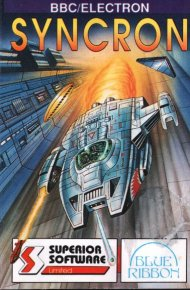
Syncron is a vertically scrolling shooter written by Gary Partis for the BBC Micro and Acorn Electron and published by Superior Software in 1987.
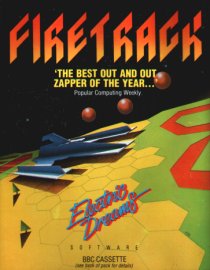
Firetrack is a vertically-scrolling shooter programmed by Nick Pelling and released for the BBC Micro and Commodore 64 platforms in 1987 by Electric Dreams Software. It was also ported to the Acorn Electron by Superior Software in 1989 as part of the Play It Again Sam 7 compilation. It resembles the 1984 arcade game Star Force in style and gameplay. The game was technically advanced and very well received by critics.

Stryker's Run is a video game designed by Chris Roberts and Philip Meller for the BBC Micro and BBC Master which was published by Superior Software in 1986. It was also later converted to the Acorn Electron. It is a 2D side-scrolling action game. It was well received, particularly for its graphics.

Pipeline is a video game for the BBC Micro and Acorn Electron, originally published by Superior Software in 1988. It is an overhead view action role-playing game set on a mining platform. It was remade for Microsoft Windows as Pipeline Plus (2004).
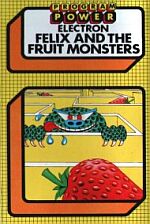
Felix and the Fruit Monsters is a video game written by John Chaytor and released by Micro Power for the BBC Micro and Acorn Electron in 1983. A sequel to platformer Felix in the Factory, it is a maze game resembling Pac-Man, but with different gameplay.

The Micro User was a British specialist magazine catering to users of the BBC Microcomputer series, Acorn Electron, Acorn Archimedes and, to a limited extent, the Cambridge Z88. It had a comprehensive mix of reviews of games, application software, and the latest Acorn computers; type-in programs, a correspondence page offering help with computer problems, and approachable technical articles on programming and the BBC Micro's internals.

The British Broadcasting Corporation Microcomputer System, or BBC Micro, is a series of microcomputers designed and built by Acorn Computers Limited in the 1980s for the Computer Literacy Project of the BBC. Designed with an emphasis on education, it was notable for its ruggedness, expandability, and the quality of its operating system. An accompanying 1982 television series, The Computer Programme, featuring Chris Serle learning to use the machine, was broadcast on BBC2.

Deathstar is multidirectional shooter for the Acorn Electron and BBC Micro developed by Peter Johnson and originally published in the UK by Superior Software in 1985. It is a clone of the arcade game Sinistar.
Gordon J. Key authored video game software for the Acorn BBC Micro, Electron and RISC OS platforms in the 1980s and 1990s. His most well-known works were published by The Fourth Dimension. He is also credited with additional programming routines in FedNet's futuristic flight combat game Star Fighter 3000 (1994), and authored Party Machine for the Amstrad CPC.















